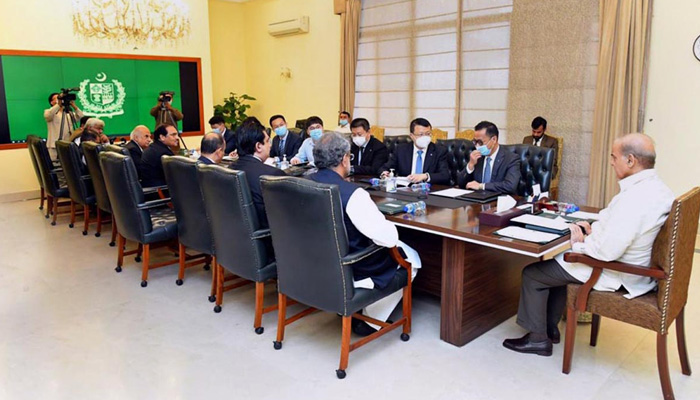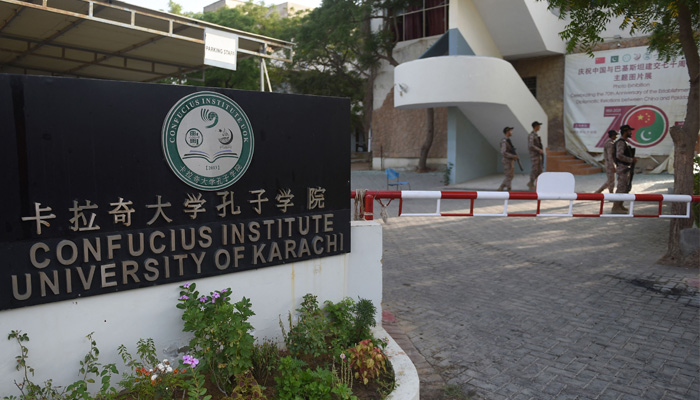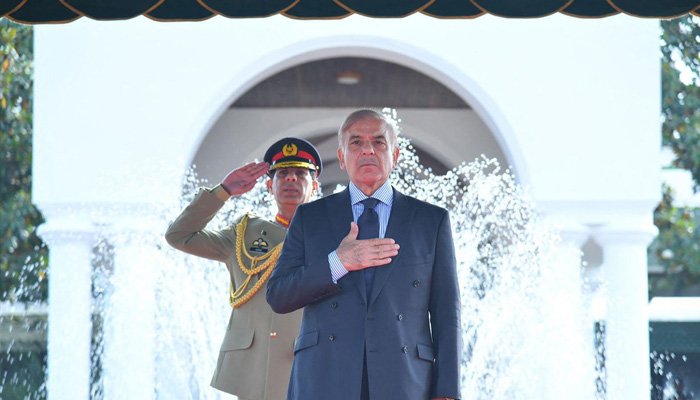[ad_1]
Pakistan’s ties with China have always been the cornerstone of its foreign policy. Both the countries have a consensus on global issues, support each other at the global fora and have repeatedly expressed the resolve to continue to deepen their friendship.
China’s consul general in Karachi, Li Bijian, spoke to Geo.tv about this friendship, as well as a range of other topics, including the recent terror attacks that killed Chinese nationals, progress on the multi-billion dollar China-Pakistan Economic Corridor (CPEC) and the political change in Pakistan.
The interview has been edited for brevity and clarity. Excerpts:
Question: Do you see any change in Pakistan with the new coalition government under Prime Minister Shehbaz Sharif taking office?
Consul General Li Bijian: I think that the new government is really impressive. This is a coalition government, where several parties are working together during a very difficult time.
My perception and assessment so far is that the government is moving in the right direction and delivering. I have met his Excellency Prime Minister Shehbaz Sharif several times. I call him the “bulldozer prime minister”, as he acts quickly. How he is working, gives us the impression that he is a man of action, who is always pushing those around him.
But the change of government is Pakistan’s internal political development and China respects your country’s political system and the choices made by the people.
Let me just add that I have been in Pakistan for several years now. The new government is facing many difficulties in terms of the political situation, which is why the new government needs to be very smart to control the situation. First, you keep the kitchen clean, tidy it up, and then move forward.
Secondly, I think that the coalition government should be accommodating and talk to the opposition parties, bring all the stakeholders on board, and move the country forward.
Political stability is a must. It is a pre-condition for the development of any country in the world, including Pakistan.
I see that first of all and most importantly, to solve the current political issues, there is a need for all the parties to come together, to fight together (for Pakistan’s progress), as it is ultimately in the interest of Pakistan.
Q: Can Pakistan face the same economic crisis as the one in Sri Lanka?
CG: I was talking to some experts, politicians and other people, who are making a comparison between Pakistan and Sri Lanka. I told them that the situation in both countries is quite different. Pakistan is, in fact, very unique in terms of the economy.
Firstly, Pakistan has a very resilient economic system. Secondly, it has a huge consumption market with a 220 million population. This provides a big backing to the economy. Thirdly, it has a very strong and robust private sector. Fourthly, Pakistani people work very hard, despite the hot climate.
Lastly, the new government has made some difficult choices, like hiking up the oil and gas price and reducing subsidies. The government is also making a compromise with the International Monetary Fund, to secure a bailout. This method, in the short term, will be very difficult for all the parties concerned. But in the long term, this will help Pakistan come out of this difficulty.
Q: It was reported that Chinese investors were facing problems during the Pakistan Tehreek-e-Insaf government. Has the new government addressed these issues?
CG: We want to express our gratitude to the current government, and the previous government, for their support in assisting companies to carry out their businesses.
As for the issues faced by some companies, one big problem was the pandemic. That is a common issue that every business is facing. Secondly, security. Recently there were some terrorist attacks, targeting Chinese interests in Pakistan, especially Chinese businesses and nationals. That made doing business difficult and sent the wrong signals to Chinese investors. The third issue is the economic situation that Pakistan is facing which is not very encouraging. But businesses everywhere are feeling the heat and so Pakistani businesses are facing pressure too.

China’s economy is very big. China is also a big country, but we don’t want to dictate. I always encourage Chinese companies to talk to their Pakistani counterparts and to find [solutions].
Also, this government is very cooperative and his excellency [Prime Minister Shehbaz Sharif] has high regard for bilateral relations and bilateral cooperation, especially the China Pakistan Economic Corridor. His excellency has been personally looking into issues and difficulties faced by the Chinese companies. He has been conducting on-site field visits as well.
Q: There have been talks between China and Pakistan regarding the terror attacks. What has become of them?
CG: It is very sad that this happened in Pakistan. Some Chinese nationals sacrificed their lives here, but you know I think such a problem exists in many countries and Pakistan is not exclusive of that.
Security issues are very complicated. But to solve this issue, we are fully dependent on the Pakistani government, establishment, security and law enforcement agencies, to find better solutions, to strengthen their protection of Chinese nationals, Chinese projects, and Chinese organisations.
I want to thank the Pakistani side for the efforts they have been putting in to solve these problems.

Also, since the Karachi university attack, the Pakistani government, from the federal down to the provincial government, have set up a mechanism. It is a unified integrated mechanism, to strengthen the security of Chinese interests here in Pakistan. Within this mechanism, both sides cooperate to strengthen the exit and entry control and to have data of the movement of Chinese nationals.
Here in Balochistan and Sindh, I am really impressed by the measures taken by the provincial governments to strengthen the protection of Chinese nationals and interests. The provincial governments are putting in more funds to provide better equipment to the police and law enforcement agencies. Under the leadership of [Inspector General] Ghulam Nabi Memon, there is a very strong team and they even set up a special protection unit to protect Chinese nationals.
Q: Now over to Afghanistan. Do you see the situation there as a hurdle to China’s Belt and Road Initiative (BRI)?
CG: We wish that the country comes out of this [difficult time] as quickly as possible, and start the reconstruction process immediately [after the earthquake].
The stability and peace of Afghanistan is very important to all the countries in the neighbourhood, including Pakistan, Iran, and other neighbouring countries in Central Asia. I think the neighbouring countries are now working together with Afghanistan to promote cooperation and to realise peace and stability.
We will always welcome it [Afghanistan] to be a part of the BRI. We are also open and positive to extending the CPEC to Afghanistan, in terms of transportation, infrastructure, people-to-people contact, financial cooperation as well as policy coordination.
Q: India’s treatment of minorities, especially Muslims, is being criticised by the global community.
CG: I think South Asia is a very important region in world affairs. India and Pakistan are major countries of the sub-continent and peace and stability in this region serves the interest not only of India, but other countries too, like Pakistan.
I call upon all the players in the sub-continent to come together to sort out their issues. We should talk, as through negotiations, through mutual consultation, we can sort out issues. This is the only way forward. This is the only way which can bring peace, stability and development to every country in the sub-continent.
I understand that some issues are very difficult to solve. You can shelf them for the time being, and concentrate on cooperation and move forward. Some issues are very complicated and attached to history, which you cannot solve within days.
[ad_2]

